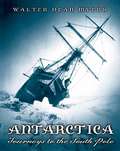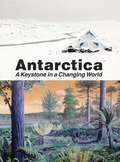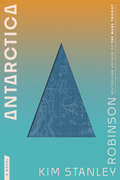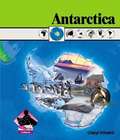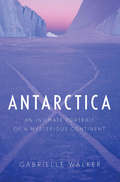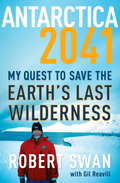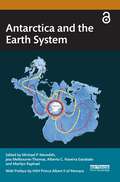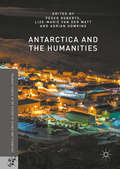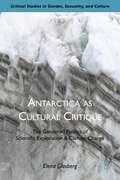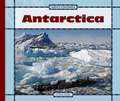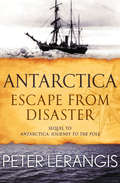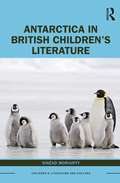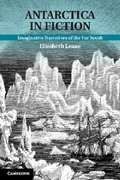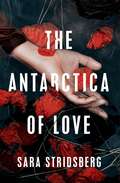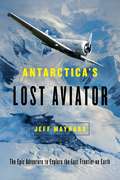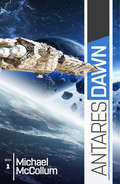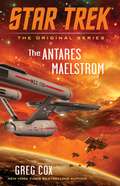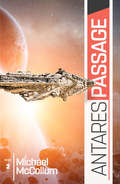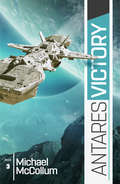- Table View
- List View
Antarctica: Journeys to the South Pole
by Walter Dean MyersThe noted author presents a thrilling record of Antarctica and the expedition parties that have uncovered the frozen continent throughout history.
Antarctica: A Keystone in a Changing World
by National Research Council of the National AcademiesAntarctica is the center from which all surrounding continental bodies separated millions of years ago. Antarctica: A Keystone in a Changing World, reinforces the importance of continual changes in the country's history and the impact of these changes on global systems. The book also places emphasis on deciphering the climate records in ice cores, geologic cores, rock outcrops and those inferred from climate models. New technologies for the coming decades of geoscience data collection are also highlighted. Antarctica: A Keystone in a Changing World is a collection of papers that were presented by keynote speakers at the 10th International Symposium on Antarctic Earth Sciences. It is of interest to policy makers, researchers and scientific institutions.
Antarctica: A Year of Science
by Racheal Rice Jeffrey B. FuerstThe continent of Antarctica is a cold and dangerous place, with towering glaciers and deep crevasses. In the summer, temperatures reach highs of only 2 degrees Celsius (36 degrees Fahrenheit), while during the winter, temperatures can reach lows of -60 degrees Celsius (-76 degrees Fahrenheit). Yet every year a few hundred scientists brave the elements to conduct important scientific research. What does it take to make the trip--and survive the winter--in Antarctica? (Set of 6 with Teacher's Guides and Text Evidence Question Card)
Antarctica
by Kim Stanley RobinsonFrom the award-winning author of the Mars Trilogy comes a thrilling new novel. . . . Kim Stanley Robinson, author of the Hugo and Nebula award-winning Mars trilogy, is one of the most original and visionary writers of fiction today. Now, in his latest novel, he takes us to a harsh, alien landscape covered by a sheet of ice two miles deep. This is no distant planet--it is the last pure wilderness on earth. A stark and inhospitable place, its landscape poses a challenge to survival; yet its strange, silent beauty has long fascinated scientists and adventurers. Now Antarctica faces an uncertain future. The international treaty that protects the continent is about to dissolve, clearing the way for Antarctica's resources and eerie beauty to be plundered. As politicians and corporations move to determine its fate from half a world away, radical environmentalists carry out a covert campaign of sabotage to reclaim the land. The winner of this critical battle will determine the future for this last great wilderness. . . .
Antarctica
by Kim Stanley RobinsonFrom the award-winning author of the Mars Trilogy comes a thrilling new novel....Kim Stanley Robinson, author of the Hugo and Nebula award-winning Mars trilogy, is one of the most original and visionary writers of fiction today. Now, in his latest novel, he takes us to a harsh, alien landscape covered by a sheet of ice two miles deep. This is no distant planet--it is the last pure wilderness on earth.A stark and inhospitable place, its landscape poses a challenge to survival; yet its strange, silent beauty has long fascinated scientists and adventurers. Now Antarctica faces an uncertain future. The international treaty that protects the continent is about to dissolve, clearing the way for Antarctica's resources and eerie beauty to be plundered. As politicians and corporations move to determine its fate from half a world away, radical environmentalists carry out a covert campaign of sabotage to reclaim the land. The winner of this critical battle will determine the future for this last great wilderness....From the Paperback edition.
Antarctica
by Cheryl StriveildiA very brief introduction to the geography, plants, and animals of Antarctica.
Antarctica: An Intimate Portrait of a Mysterious Continent
by Gabrielle WalkerThe acclaimed science writer presents a wide-ranging exploration of Antarctica&’s history, nature, and global significance in this &“rollicking good read&” (Kirkus). From the early expeditions of Ernest Shackleton to David Attenborough&’s documentary series Frozen Planet, the continent of Antarctica has captured the world&’s imagination. After the Antarctic Treaty of 1961, decades of scientific research revealed the true extent of its many mysteries. Now former Nature magazine staff writer Gabrielle Walker tells the full story of Antarctica—from its fascinating history to its uncertain future and the international teams of researchers who brave its forbidding climate. Drawing on her broad travels across the continent, Walker weaves all the significant threads of life on the vast ice sheet into a multifaceted narrative, illuminating what it really feels like to be there and why it draws so many different kinds of people. She chronicles cutting-edge science experiments, visits to the South Pole, and unsettling portents about our future in an age of global warming. &“We are all anxious Antarctic watchers now, and Walker's book is the essential primer.&”—The Guardian, UK
Antarctica
by David W. H. WaltonThis thought-provoking and ambitious volume surveys the causes and extent of environmental contamination in Antarctica, and looks critically at future prospects. It highlights the key role that modern techniques of analytical chemistry play in achieving reliable empirical data in this field and their impact on shaping legal provisions. Written by prominent scientists and experts in Antarctic sciences, this work gives an overview of the studies undertaken by countries to assess the impact of pollution phenomena on the uniquely clean environment of Antarctica. Empirical studies and regulatory issues are evaluated in context with the goal of providing a model approach to more polluted areas of the world.
Antarctica 2041: My Quest to Save the Earth's Last Wilderness
by Robert Swan Gil ReavillAdventurer-turned-environmentalist Swan illuminates the perils facing the planet come 2041--the year when the international treaty protecting Antarctica is up for review. The author provides information people need to know to understand the world's environmental crisis, and the tools they need to combat it.
Antarctica and the Earth System
by Michael P. Meredith Jess Melbourne-Thomas Naveira Garabato, Alberto C. Marilyn RaphaelThis book presents a state-of-the-art overview of the role that Antarctica and the Southern Ocean play as integral parts of the Earth System.While often characterised as the last great wilderness on Earth, Antarctica is intimately connected to the rest of the planet, exerting key influences on all places and all people. It is also vulnerable to global changes, especially those driven by humans. This book examines how Antarctica and the Southern Ocean are connected to the rest of the planet, and what these connections mean for the future of Planet Earth and all its inhabitants. It transcends traditional disciplinary boundaries to explore this role across physical, ecological, political, and social systems. Drawing on the latest research findings and thinking, the volume identifies the current leading-order challenges across each of these spheres, highlighting areas where enhanced focus is needed. With the role of Antarctica in the Earth System being one of the most relevant themes of our times, this book will help audiences to understand Antarctica and the Southern Ocean in a global perspective.Antarctica and the Earth System will be of great interest to a wide range of interdisciplinary students and scholars of Earth sciences, Antarctic studies, polar science, and environmental management.The Open Access version of this book, available at http://www.taylorfrancis.com, has been made available under the Creative Commons Attribution (CC-BY) 4.0 license.
Antarctica and the Humanities (Palgrave Studies in the History of Science and Technology)
by Peder Roberts Lize-Marié Watt Adrian HowkinsThe continent for science is also a continent for the humanities. Despite having no indigenous human population, Antarctica has been imagined in powerful, innovative, and sometimes disturbing ways that reflect politics and culture much further north. Antarctica has become an important source of data for natural scientists working to understand global climate change. As this book shows, the tools of literary studies, history, archaeology, and more, can likewise produce important insights into the nature of the modern world and humanity more broadly.
Antarctica as Cultural Critique
by Elena GlasbergArguing that Antarctica is the most mediated place on earth and thus an ideal location for testing the limits of bio-political management of population and place, this book remaps national and postcolonial methods and offers a new look on a 'forgotten' continent now the focus of ecological concern.
Antarctica (Earth's Continents)
by Mary LindeenEARTH'S CONTINENTS lets you begin exploring Earth's seven continents. Learn about each continent's land, people, animals, and cultures just by turning the pages! Read all the books in the EARTH'S CONTINENTS series: Africa; Antarctica; Asia; Australia; Europe; North America; South America. Picture captions and descriptions present.
Antarctica: Escape from Disaster (Antarctica Ser. #Vol. 2)
by Peter LerangisTrapped in Antarctic ice, Jack Winslow and his sons fight to get homeIt has been nearly a year since Jack Winslow and his two sons, Colin and Andrew, set out to conquer Antarctica. While Colin and most of the crew stayed behind on the ship, Andrew made a dash for the South Pole, nearly dying in the process. When he returns to the Mystery, frostbitten and frail, the ship has become wedged between two ice floes. As the crew hacks at the ice with pick-axes, trying desperately to free the ship, the ice shifts, shattering the hull and giving the Winslows and their team just enough time to gather provisions before the Mystery plummets into the frigid water. Hundreds of miles of ice and sea stand between the Winslows and safety. As food becomes scarce, the crew begins grumbling of mutiny. Colin and Andrew are tired, hungry, and freezing cold—but their struggle for survival has only just begun. This ebook features an illustrated biography of Peter Lerangis including rare photos and never-before-seen documents from the author&’s personal collection.
Antarctica in British Children’s Literature (Children's Literature and Culture)
by Sinead MoriartyFor over a century British authors have been writing about the Antarctic for child readers, yet this body of literature has never been explored in detail. Antarctica in British Children’s Literature examines this field for the first time, identifying the dominant genres and recurrent themes and tropes while interrogating how this landscape has been constructed as a wilderness within British literature for children. The text is divided into two sections. Part I focuses on the stories of early-twentieth-century explorers such as Robert F. Scott and Ernest Shackleton. Antarctica in British Children’s Literature highlights the impact of children’s literature on the expedition writings of Robert Scott, including the influence of Scott’s close friend, author J.M. Barrie. The text also reveals the important role of children’s literature in the contemporary resurgence of interest in Scott’s long-term rival Ernest Shackleton. Part II focuses on fictional narratives set in the Antarctic, including early-twentieth-century whaling literature, adventure and fantasy texts, contemporary animal stories and environmental texts for children. Together these two sections provide an insight into how depictions of this unique continent have changed over the past century, reflecting transformations in attitudes towards wilderness and wild landscapes.
Antarctica in Fiction: Imaginative Narratives of the Far South
by Elizabeth LeaneThis comprehensive analysis of literary responses to Antarctica examines the rich body of literature that the continent has provoked over the last three centuries, focussing particularly on narrative fiction. Novelists as diverse as Edgar Allan Poe, James Fenimore Cooper, Jules Verne, H. P. Lovecraft, Ursula Le Guin, Beryl Bainbridge and Kim Stanley Robinson have all been drawn artistically to the far south. The continent has also inspired genre fiction, including a Mills and Boon novel, a Phantom comic and a Biggles book, as well as countless lost-race romances, espionage thrillers and horror-fantasies. Antarctica in Fiction draws on these sources, as well as film, travel narratives and explorers' own creative writing. It maps the far south as a space of the imagination and argues that only by engaging with this space, in addition to the physical continent, can we understand current attitudes towards Antarctica.
The Antarctica of Love
by Sara StridsbergThey say you die three times. The first time for me was when my heart stopped beating beneath his hands by the lake.The second was when what was left of me was lowered into the ground in front of Ivan and Raksha at Bromma Church. The third will be the last time my name is spoken on earth."A haunting portrait of the starkest meanings of love and family. Stridsberg's literary talent left me awestruck" Kate Reed Petty, author of True Story"A disturbingly beautiful book" ExpressenInni lives her life on the margins, but it is a life that is full and complex, filled with different shades of dark and light... Until she is brutally murdered one summer's day, on a lake shore at the heart of a distant, rain-washed forest.On the surface, this is the story of the moment her life is violently extinguished - a moment that will never end, not ever - but it is also about the time before, and about the lives that carry on afterwards. It's about her children, her parents, her childhood of neglect, her volatile adolescence, and the chain of choices, tragedies and accidents that lead her to a life on the streets and take her into the wrong crowd, the wrong places and, finally, the wrong car with the wrong person.Sara Stridsberg's new novel is about absolute vulnerability, brutality and isolation. At times disturbing, this is a devastating story of unexpected love, tenderness and light in the total darkness.Translated from Swedish by Deborah Bragan-Turner
Antarctica's Lost Aviator: The Epic Adventure To Explore The Last Frontier On Earth
by Jeff MaynardThe astonishing voyage of the first solo crossing of Antarctica by the unlikeliest of arctic explorers. By the 1930s, no one had yet crossed Antarctica, and its vast interior remained a mystery frozen in time. Hoping to write his name in the history books, wealthy American Lincoln Ellsworth announced he would fly across the unexplored continent. And to honor his hero, Wyatt Earp, he would carry his gun belt on the flight. The main obstacles to Ellsworth’s ambition were numerous: he didn’t like the cold, he avoided physical work, and he couldn’t navigate. Consequently, he hired the experienced Australian explorer, Sir Hubert Wilkins, to organize the expedition on his behalf. While Ellsworth battled depression and struggled to conceal his homosexuality, Wilkins purchased a ship, hired a crew, and ordered a revolutionary new airplane constructed. The Ellsworth Trans-Antarctic Expeditions became epics of misadventure, as competitors plotted to beat Ellsworth, pilots refused to fly, crews mutinied, and the ship was repeatedly trapped in the ice. Finally, in 1935, Ellsworth took off to fly from the Weddell Sea to the Ross Sea. A few hours after leaving, radio contact with him was lost and the world gave him up for dead. Antarctica’s Lost Aviator brings alive one of the strangest episodes in polar history, using previously unpublished diaries, correspondence, photographs, and film to reveal the amazing true story of the first crossing of Antarctica and how, against all odds, it was achieved by the unlikeliest of heroes.
Antares Dawn: 2019 Edition (Antares Trilogy #1)
by Michael McCollumWhen the supergiant star Antares exploded in 2512, the human colony on Alta found their pathway to the stars gone, isolating them from the rest of human space for more than a century.When a powerful warship materializes in the system without warning, the commanders of the Altan Space Navy are alarmed. They dispatch one of Alta’s most powerful ships to investigate, only to discover the unknown behemoth is battered and helmed by a dead crew.This is disturbing news for the Altans as the defeated battleship would have easily defeated the whole of the Altan navy on it’s own. And if that ship was able to stumble into the Altan system, so too could the force responsible for its destruction. Something must be done.
Antares Dawn
by Michael MccollumAfter the star Antares exploded,destroying the foldpoints that permitted travel to the stars, the Altan System was cut off from Human Space for more than a century. Then, in 2637 a huge spacegoing battleship ' flashed into the system. When the Altan Space Navy finally caught up with the behemoth, it found only a battered hulk and a few dead Earthmen. Something had clearly beaten the awesome Terran spacecraft in a battle to the death. And that was disturbing news indeed. For the dead battleship could easily have defeated the entire Altan system by itself. If it could blunder into the system, so could whatever had demolished it. / Something would have to be done...
The Antares Maelstrom (Star Trek: The Original Series)
by Greg CoxAn epic new Star Trek saga by New York Times bestselling author Greg Cox set during the original Five-Year Mission!The final frontier erupts into chaos as vast quantities of a rare energy source are discovered beneath the surface of Baldur-3, a remote planet beyond the outer fringes of Federation space. Now an old-fashioned &“gold rush&” is underway as a flood of would-be prospectors, from countless worlds and species, races toward the planet to stake their claim. The galactic stampede threatens the stability of neighboring planets and space stations, as widespread strife and sabotage and all-around pandemonium result in a desperate need for Starfleet assistance. Captain James T. Kirk and the crew of the Starship Enterprise are dispatched to deal with the escalating crisis…which lies on the other side of a famously perilous region of space known as the Antares Maelstrom.
Antares Passage: 2019 Edition (Antares Trilogy #2)
by Michael McCollumAfter more than a century of isolation, the paths between stars are again open and the people of Alta in contact with their sister colony on Sandar. And yet, the opening of the foldlines has not been the pure blessing the Altans had supposed.The reestablishment of interstellar travel has brought with it news of the encroaching Ryall, an alien race whose goal is the extermination of humanity. If they are to avoid defeat at the hands of the alien forces, Alta must seek out the military might of Earth. The only suitable path, however, requires a journey into the heart of a supernova...
Antares Passage
by Michael MccollumFROM THE BACK COVER: Project Helldiver. After more than a century of isolation, the people of Alta were once again in contact with the rest of human space. But that reunion, led by Captain Richard Drake, spelled the end of civilization on Alta. For the people of the nearest star system were under siege by an alien race called the Ryall, whose only goal in life seemed to be the utter destruction of all Mankind. And it liked as if they might succeed. The only hope for these worlds lay with the greater military forces of Earth itself. But to reach Earth, they would have to take the one path not held by the Ryall, and that way passed through the Antares system, which was awash with the deadly radiation of a supernova. It was a risk they would have to take, and Richard Drake would lead the way into hell. This is the second in the Antares trilogy.
Antares Victory: 2019 Edition (Antares Trilogy #3)
by Michael McCollumAfter a century of warfare, humanity finally discovered the Achilles heel of the Ryall, their xenophobic reptilian foe. Spica – Alpha Virginis – is the key star system in enemy space. It is the hub through which all Ryall starships must pass, and if Alta and their allies can just capture and hold it, they will strangle the Ryall war machine and end its threat to humankind forever.It all seemed so simple in the computer simulations: Advance by stealth, attack without warning, strike swiftly with overwhelming power. Unfortunately, the logistics prove to be the easy part. With the key to victory in hand, Richard and Bethany Drake must temper the volatile role of human nature if they are to bring down the alien foe…
Antares Victory
by Michael MccollumFROM THE BACK COVER: After a century of warfare, humanity has finally discovered the Achilles heel of the Ryall, their xenophobic reptilian foe. Spica Alpha Virginis, is the key star system in enemy space. It is the hub through which all enemy starships must pass, and if humanity can only capture and hold it, they will strangle the war machine of their foes and forever end the Ryall threat. It all seemed so simple in the computer simulations: Advance by stealth, attack without warning, strike swiftly with overwhelming power. Unfortunately, conquering Spica proves the easy part. With the key to victory in hand, Richard and Bethany Drake discover that they must also conquer human nature if they are to bring down the alien foe.
